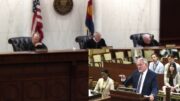By Jeffrey A. Roberts
CFOIC Executive Director
A judge recently ordered the public disclosure of a school board executive session recording because board members did not take an “affirmative vote” before convening the private online meeting, as the Colorado Open Meetings Law requires.
While no members of the Summit School District Board of Education objected to the May 1, 2020, executive session to discuss candidates for the superintendent’s job, “Undoubtedly, the Board failed to take any action that came close to resembling a vote,” concluded Summit County District Court Judge Karen Ann Romeo in a Dec. 11 ruling.

To properly convene a closed meeting, a local public body is required under the open meetings law to do three things: 1) cite the specific statutory provision authorizing the executive session; 2) announce the discussion topic “in as much detail as possible without compromising the purpose for which the executive session is authorized”; and 3) get the “affirmative vote” of two-thirds of the quorum present.
On May 1, one member of the school board made a motion to go into executive session and another seconded the motion, according to court documents. Board members then transitioned from the public meeting and joined a separate, non-public session on a virtual conferencing platform.
“This was a far cry from any definition of vote much less the Board’s own definition articulated in the School District’s policy manual,” the judge wrote.
In a court filing, an attorney for the school board contended the board “properly” convened the executive session when all members left the public portion of the meeting and entered a new, separate link for the executive session “with no Board member objecting to the action.”
Because the open meetings law does not specifically define “vote,” the attorney wrote, “the requirement for Board approval should not be over-read to include a specific required action, other than some affirmative action that confirms at least two-thirds of the quorum supported the use of the executive session.”
But not objecting or speaking up is “insufficient to constitute a vote and is merely evidence of capitulation or at most, implied consent,” Romeo determined. Neither is the same as an affirmative vote, “no matter how trivial the decision,” she added.
The school board’s attorney also argued that the Colorado Open Records Act prohibits the disclosure of information about the superintendent applicants discussed during the executive session. But the judge cited case law holding that “information loses its protection if the public body reveals it during an improperly convened executive session.”
Romeo ordered the school board to release a full copy of the executive session recording and a transcript to Matt Roane, the Pagosa Springs attorney who filed the lawsuit.
Follow the Colorado Freedom of Information Coalition on Twitter @CoFOIC. Like CFOIC’s Facebook page. Do you appreciate the information and resources provided by CFOIC? Please consider making a tax-deductible donation.




